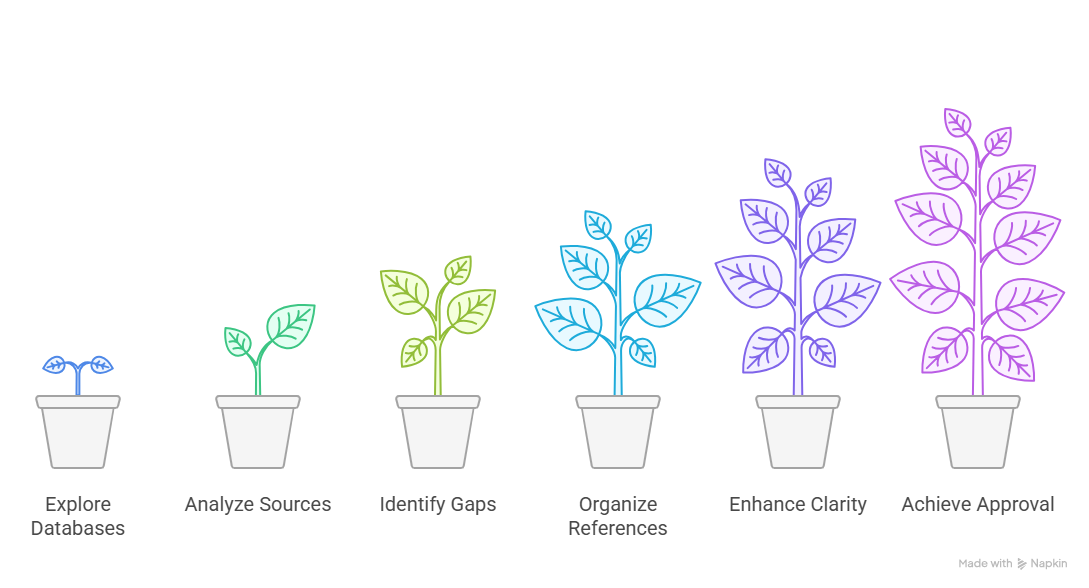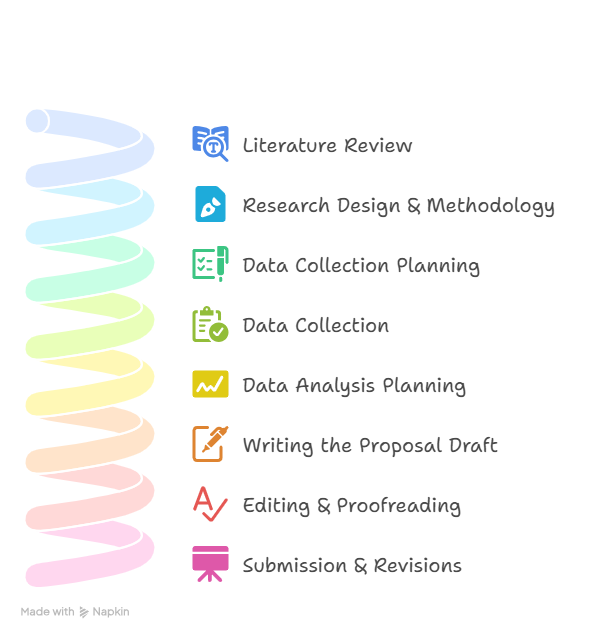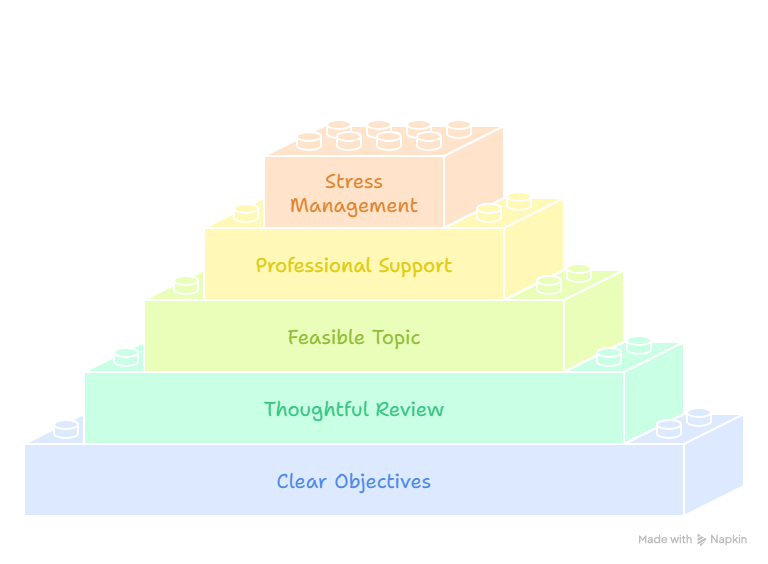Dissertation proposal writing is a pivotal step in your PhD journey. It transforms your research idea into a structured plan that earns your committee’s approval. At PhDizone, we understand the challenges of crafting a compelling proposal. This guide offers practical strategies to streamline your dissertation proposal writing process, from selecting a research topic to polishing your final draft. With expert tips tailored for PhD students, you’ll learn how to create a proposal that stands out and sets a strong foundation for your dissertation success.
Table of Contents
Dissertation Proposal
Dissertation proposal writing is a critical step in your PhD journey. It produces a document that outlines your planned research. This blueprint details your research question, objectives, methodology, and the study’s significance. It provides a clear roadmap for your dissertation. A well-executed dissertation proposal writing process convinces your academic committee that your project is feasible, original, and valuable to your field. It typically includes an introduction, literature review, methodology, and timeline. All are aligned with your university’s guidelines. At PhDizone, we specialize in guiding students through dissertation proposal writing. A strong proposal not only secures approval but also keeps your research focused, saving time and effort later. By mastering this step, you lay a solid foundation for a successful dissertation.
Why Dissertation Proposal Writing Matters
Dissertation proposal writing is the cornerstone of your PhD journey. It shapes your research process and secures your committee’s approval. It’s not just a formality—it’s a strategic tool. It aligns your research goals with academic expectations, ensuring a focused and feasible study. At PhDizone, we guide students through dissertation proposal writing to create compelling, committee-ready documents. Here’s why it matters:
- Clarifies Research Direction: A well-written proposal defines your research question and scope, preventing issues like scope creep.
- Secures Committee Approval: Dissertation proposal writing demonstrates your project’s originality and feasibility, convincing advisors of its academic value.
- Saves Time and Effort: A clear proposal acts as a roadmap, streamlining tasks like data collection and analysis.
- Builds Confidence: A strong proposal, refined with PhDizone’s expert consultation, boosts your readiness for the dissertation process.
By investing in dissertation proposal writing, you lay a solid foundation for a successful PhD. This ensures your research is impactful and aligned with your field’s needs. PhDizone’s tailored support, from mentoring to editing, helps you craft a proposal that stands out and sets you up for success.
Step-by-Step Guide to Dissertation Proposal Writing: From Idea to Approval
Choosing a Research Topic for Your Proposal
Selecting a topic for dissertation proposal writing is a critical step. It shapes your entire PhD journey. A well-defined, focused, and meaningful topic makes your dissertation proposal both persuasive and practical. At PhDizone, we guide students to choose topics that align with academic goals and spark curiosity. Here’s how to approach dissertation proposal writing with a strong topic:
- Focus on Specificity: Narrow broad ideas to manageable scopes.
- Identify Literature Gaps: Use academic databases like Google Scholar or PubMed to review existing studies. Look for unanswered questions or under-explored areas to justify your research’s originality.
- Ensure Researchability: Confirm access to data, resources, and methodologies. A topic like “global climate policies” may be too broad without specific datasets.
- Align with Significance: Choose a topic that contributes to your field, addressing real-world or academic needs.
PhDizone’s consultation services help refine your topic, ensuring it meets university standards and committee expectations. A well-chosen topic makes dissertation proposal writing smoother, setting a clear path for your research.
Crafting a Compelling Introduction
A strong introduction in dissertation proposal writing hooks your committee. It sets the tone for your proposal. It must present a clear problem statement, highlight research significance, and outline objectives concisely. PhDizone’s expertise ensures your introduction aligns with university guidelines, making a lasting impression. Follow this structure for effective dissertation proposal writing:
- Provide Context: Briefly introduce the research area
- State the Problem: Clearly articulate the issue your research addresses
- Define Objectives: Outline your research goals
- Highlight Significance: Explain why your research matters to academia or society.
PhDizone’s tip: Use concise, academic language to meet committee expectations. Our editing services refine your introduction. This ensures clarity and impact so your proposal stands out from the start.
Writing a Strong Literature Review
A literature review is more than just a summary. It’s a strategic foundation for your dissertation proposal. It showcases your understanding of existing research. It identifies the academic space your study will occupy. Writing a strong literature review involves carefully analyzing scholarly work relevant to your topic. You should compare different viewpoints and highlight key trends or inconsistencies in the field.
To begin the Dissertation Proposal writing process, explore academic databases like JSTOR, Google Scholar, and Scopus to gather peer-reviewed articles, books, and theses. Use keywords aligned with your research question to find sources directly relevant to your study. Instead of merely summarizing the findings, critically evaluate the methodologies, outcomes, and how they align or differ from each other..
A critical part of this process is identifying research gaps—areas that previous studies haven’t fully explored. These gaps are where your dissertation can add unique value. Ask yourself: What questions remain unanswered? Are there conflicting results or overlooked populations? Highlighting these gaps not only justifies your research but also shows your ability to think independently and contribute to the academic discourse.
To organize your literature effectively, use reference management tools.Help you categorize articles, insert citations seamlessly, and maintain a well-structured bibliography.
At PhDiZone, we provide expert editing and consultation support. This enhances the clarity, flow, and academic integrity of your literature review. Our team ensures your review aligns with institutional standards and properly supports your proposal’s research goals.
By crafting a thorough, critical, and well-organized literature review, you lay the groundwork for a compelling dissertation proposal that commands attention and earns approval.
Defining Clear Research Questions and Objectives
Defining precise research questions and objectives is a foundational step in writing a successful dissertation proposal. Clear questions not only guide your study’s direction but also demonstrate academic focus and feasibility to your committee.
A proven approach for developing strong research questions is using the SMART criteria—they should be Specific, Measurable, Achievable, Relevant, and Time-bound. This framework ensures your questions are grounded and research-ready, helping you avoid vague or overly broad inquiries.
For instance, instead of asking, “How does social media affect mental health?”—which is too general—you could refine it to:
“What is the impact of daily Instagram use on anxiety levels in young adults aged 18–25 over a six-month period?”
This question is narrow, quantifiable, and focuses on a defined demographic and timeframe.
Once your research questions are in place, outline your objectives. This includes what your study aims to discover, prove, or analyze. Objectives should align directly with your questions and form the basis for your methodology.
At PhDiZone, we specialize in guiding students through this critical process. Our consultation services help refine your questions to ensure clarity, relevance, and academic alignment. Whether you’re starting from scratch or polishing a draft, our experts can transform your raw ideas into well-structured research aims that strengthen your entire proposal.
With clear, SMART-driven research questions and objectives, your dissertation proposal becomes a focused and persuasive plan of action.
Writing a Strong Literature Review
A literature review is more than just a summary—it’s a strategic foundation for your dissertation proposal. It showcases your understanding of existing research and identifies the academic space your study will occupy. Writing a strong literature review involves carefully analyzing scholarly work relevant to your topic, comparing different viewpoints, and highlighting key trends or inconsistencies in the field.
To begin, explore academic databases like JSTOR, Google Scholar, and Scopus to collect peer-reviewed articles, books, and theses. Use keywords aligned with your research question to find sources that directly relate to your study. Don’t just summarize the findings—evaluate methodologies, outcomes, and how they connect or diverge from one another.
A critical part of this process is identifying research gaps—areas that previous studies haven’t fully explored. These gaps are where your dissertation can add unique value. Ask yourself: What questions remain unanswered? Are there conflicting results or overlooked populations? Highlighting these gaps not only justifies your research but also shows your ability to think independently and contribute to the academic discourse.
To organize your literature effectively, use reference management tools like Mendeley or Zotero. These tools help you categorize articles, insert citations seamlessly, and maintain a well-structured bibliography.
At PhDiZone, we provide expert editing and consultation support to enhance the clarity, flow, and academic integrity of your literature review—an essential component of effective Dissertation Proposal writing. Our team ensures your review aligns with institutional standards and strongly supports your proposal’s research objectives.
By crafting a thorough, critical, and well-organized literature review, you lay the groundwork for a compelling dissertation proposal that commands attention and earns approval.
Defining Clear Research Questions and Objectives
Defining precise research questions and objectives is a foundational step in writing a successful dissertation proposal. Clear questions not only guide your study’s direction but also demonstrate academic focus and feasibility to your committee.
A proven approach for developing strong research questions is using the SMART criteria—they should be Specific, Measurable, Achievable, Relevant, and Time-bound. This framework ensures your questions are grounded and research-ready, helping you avoid vague or overly broad inquiries.
Instead of posing a broad question like “How does social media influence mental health? you could refine it into a more targeted and well-defined question.. “What is the impact of daily Instagram use on anxiety levels in young adults aged 18–25 over a six-month period?”
This question is narrow, quantifiable, and focuses on a defined demographic and timeframe.
PhDiZone provides expert support to help students navigate this essential stage. Our consultation services help refine your questions to ensure clarity, relevance, and academic alignment. Whether you’re starting from scratch or polishing a draft, our experts can transform your raw ideas into well-structured research aims that strengthen your entire proposal.
PhDiZone provides expert support to help students navigate this essential stage with confidence and clarity. Our consultation services help refine your questions to ensure clarity, relevance, and academic alignment. Whether you’re starting from scratch or polishing a draft, our experts can transform your raw ideas into well-structured research aims that strengthen your entire proposal.
With clear, SMART-driven research questions and objectives, your dissertation proposal becomes a focused and persuasive plan of action.
Selecting the Right Methodology
Choosing the correct methodology is a vital part of Dissertation Proposal writing, as it ensures your research produces accurate and reliable results. Here’s a breakdown of the main types and how to select the most suitable approach for your study:
1. Qualitative Research
- Purpose: Explores how and why phenomena occur through in-depth understanding.
- Methods: Interviews, focus groups, case studies, content analysis.
- When to Use: Ideal for exploring perceptions, behaviors, and complex human experiences.
- Example: Understanding how first-year university students emotionally adapt to online learning.
2. Quantitative Research
- Purpose: Measures variables and analyzes statistical data to identify patterns or relationships.
- Methods: Surveys, experiments, structured observations, numerical data collection.
- When to Use: Best for testing hypotheses, measuring frequencies, or analyzing large populations.
3. Mixed Methods
- Objective: Integrates both qualitative and quantitative methods to deliver comprehensive and well-rounded insights.
- Methods: Sequential or concurrent use of surveys and interviews.
- When to Use: When your study benefits from both statistical analysis and detailed perspectives.
- Example: Surveying students on online learning satisfaction and conducting interviews for deeper insights.
4. Justifying Your Methodology
- Align with Research Goals: Choose a method that directly supports your research question.
- Consider Practical Factors: Resources, time, access to data, and ethical concerns.
- Demonstrate Feasibility: Explain how the chosen method will realistically gather the data you need.
5. PhDiZone’s Expertise
At PhDiZone, we offer expert guidance in selecting and designing the most suitable methodology for your study. Our academic consultants help you justify your choice clearly and align it with university standards to increase proposal approval chances.
Creating a Realistic Timeline
A well-planned timeline is essential. It keeps your dissertation proposal process organized, focused, and stress-free. It demonstrates to your committee that you understand the scope of your research. You can manage your time effectively.
Break Down Major Tasks
To stay on track, divide the proposal into clear, manageable stages:
- Literature Review
Search, read, and summarize existing research. - Research Design & Methodology
Choose and justify the method: qualitative, quantitative, or mixed. - Data Collection Planning
As part of your Dissertation Proposal writing process, prepare essential research instruments such as surveys or interview guides to collect accurate and relevant data. - Data Collection
Conduct surveys, interviews, or gather secondary data. - Data Analysis Planning
Detail the methods and software you will use to interpret and evaluate your research data. - Writing the Proposal Draft
Compile your introduction, methodology, literature review, and objectives. - Editing & Proofreading
Review, refine, and ensure adherence to academic standards. - Submission & Revisions –
Present your proposal to the review panel and make necessary adjustments according to their input.
Best Practices for Effective Dissertation Proposal Writing
Dissertation Proposal writing is a vital step in your academic journey. Applying the right strategies can greatly enhance your proposal’s quality and approval success. Here’s how to ensure your proposal is strong, focused, and impactful:
1. Set Clear and Specific Objectives
Well-defined research objectives form the foundation of a strong proposal. Instead of broad statements, use focused goals that are specific, measurable, and achievable.
Example: Rather than “This study aims to understand climate change,” try “This study investigates the impact of local climate adaptation policies in coastal cities between 2000–2020.”
2. Build a Thoughtful Literature Review
Go beyond listing sources—critically engage with the literature. Highlight patterns, contradictions, and gaps in existing research to show the relevance of your study. This demonstrates your academic insight and adds depth to your proposal.
3. Choose a Feasible and Well-Scoped Topic
Select a research topic that is realistic in terms of time, resources, and data access. A focused and manageable topic allows for better planning and execution, helping you stay on track throughout your dissertation journey.
4. Enhance Quality with Professional Support
At PhDiZone, we support students in crafting high-quality proposals through expert editing and personalized feedback. Our team ensures your Dissertation Proposal writing is clear, well-structured, and aligned with academic standards.
Staying Calm & Focused During Dissertation Proposal Writing
Dissertation Proposal writing can be an intensive process, but with the right mindset and strategies, you can manage it confidently and effectively. Here are some positive techniques to maintain focus and reduce stress:
1. Use the Pomodoro Technique for Better Focus
Break your work into 25-minute focused sessions, followed by 5-minute breaks. This simple method keeps your energy up and helps prevent burnout during long writing hours.
2. Set Achievable Milestones
Divide your proposal into manageable parts—such as completing the literature review, drafting research objectives, or designing your methodology. Acknowledge every achievement along the way to maintain motivation and keep your progress moving forward.
3. Seek Support Through Collaboration
Don’t hesitate to share your progress with peers, mentors, or academic advisors. Constructive feedback can bring clarity, boost your confidence, and accelerate your Dissertation Proposal writing.
4. Join PhDiZone’s Stress Management Workshops
At PhDiZone, we offer expert-led sessions focused on academic writing, time management, and emotional resilience. These workshops are designed to help you manage pressure and stay on track throughout your research journey.
Revising and Polishing Your Proposal
Once you’ve written your first draft, the revision process becomes critical in refining your work. Effective Dissertation Proposal writing isn’t done in a single attempt. It involves multiple drafts and careful polishing to meet academic standards.
Use this checklist during revision:
- Ensure coherence: Each section should flow logically into the next.
- Review your writing for grammatical mistakes and punctuation issues that could undermine the clarity of your argument.
- Review formatting: Follow your institution’s style guide (APA, MLA, etc.).
- Verify citations and references for accuracy and completeness.
- Eliminate redundant or unclear content for a concise proposal.
Feedback is key. Share your draft with your advisor or a peer for constructive insights. Iterative improvements based on feedback can dramatically elevate the clarity, structure, and strength of your proposal.
At PhDiZone, we offer professional proofreading and academic editing services tailored for research scholars. Our experts help you refine sentence structure, tone, grammar, and formatting—ensuring your Dissertation Proposal writing is polished, persuasive, and ready for submission.
Investing time in revision is not just about fixing mistakes; it’s about presenting your research ideas in the most effective and academically credible way possible.
Conclusion
Dissertation Proposal writing is a crucial step. It shapes the direction and success of your PhD journey. From selecting a specific, researchable topic to structuring your proposal with clear objectives, methodology, and timeline—each phase requires thoughtful planning and execution.
By avoiding common mistakes, using time-tested techniques like the Pomodoro method, and actively seeking feedback, you can streamline the process and improve your outcomes. A well-organized, compelling proposal not only earns committee approval but also sets a strong foundation for your dissertation.
Approach the process systematically, take it one step at a time, and remember—you’re not alone.











